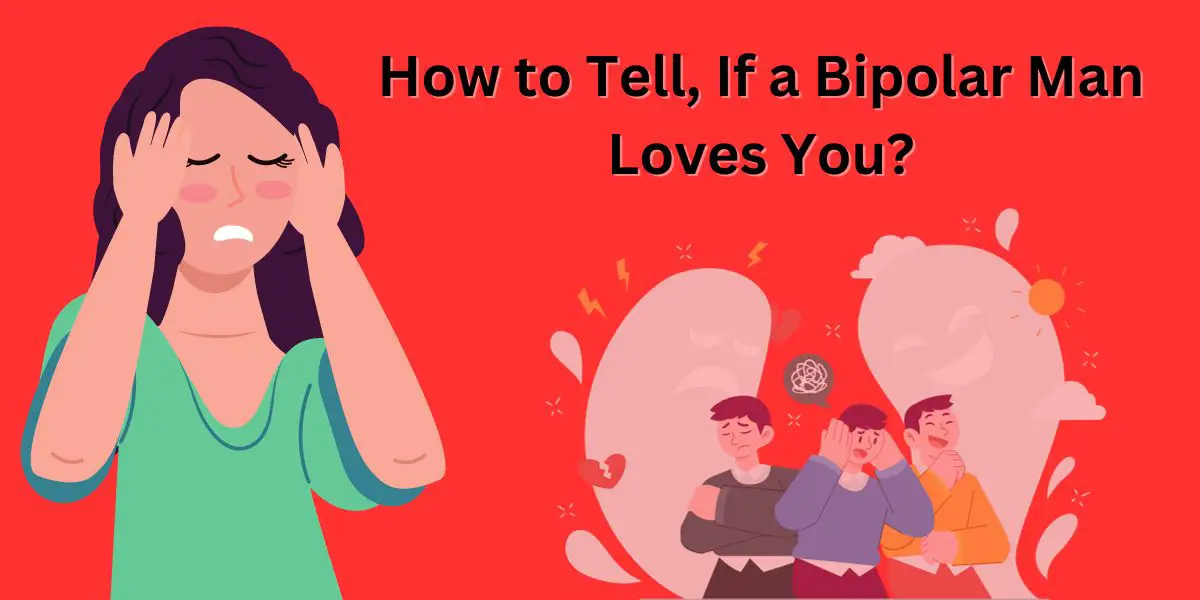Navigating relationships can be challenging, but when you’re in love with someone experiencing bipolar disorder, it adds an extra layer of complexity. Bipolar disorder is characterized by extreme mood swings, and understanding whether a bipolar man truly loves you requires a nuanced approach. So here we discuss about How to Tell If a Bipolar Man Loves You.
What is Bipolar Disorder?
Bipolar disorder is a mental health condition that involves extreme mood swings, including manic highs and depressive lows. These mood fluctuations can significantly impact relationships, making it crucial for partners to comprehend the intricacies involved.
The Importance of Understanding Bipolar Relationships
Before delving into the signs of love, it’s essential to emphasize the significance of comprehending bipolar relationships. Partners play a vital role in providing support and understanding, contributing to the overall well-being of their loved ones.
Signs of Love in a Bipolar Man
Understanding the Mood Swings
One key aspect is recognizing how a bipolar man manages his mood swings. If he consistently expresses love and affection during stable periods, it’s a positive indicator of genuine emotions.
Consistency in Affection
Genuine love is reflected in consistent affection, irrespective of mood fluctuations. A bipolar man who loves you will make an effort to express his feelings consistently, creating a stable emotional foundation.
Effective Communication
Communication is the cornerstone of any successful relationship. A bipolar man in love will communicate openly about his emotions, enabling both partners to navigate the challenges together.
Supportive Behavior
Love is often expressed through actions. A bipolar man who loves you will exhibit supportive behavior, especially during challenging times. This support is indicative of a deep emotional connection.
Also Read: The Secret to Conscious Relationships Revealed in ‘Getting the Love You Want’
Challenges in Recognizing Love
Confusing Mixed Signals
Bipolar individuals may unintentionally send mixed signals due to mood swings. Deciphering these signals requires patience and understanding, as actions during manic or depressive episodes may not accurately reflect true emotions.
Impact of Mood Episodes
Mood episodes, whether manic or depressive, can temporarily cloud feelings of love. It’s essential to differentiate between the impact of the disorder and the person’s genuine emotions.
Fear of Rejection
Fear of rejection is common among individuals with bipolar disorder. This fear might hinder their ability to express love openly. Partners need to create a safe space for open communication to address this concern.
Coping Strategies for the Partner
Educate Yourself about Bipolar Disorder
Knowledge is empowering. Educate yourself about bipolar disorder to better understand the challenges your partner faces. This knowledge will enable you to provide the necessary support without judgment.
Open Communication Channels
Create an environment where open communication is encouraged. Discussing feelings, concerns, and challenges helps build trust and strengthens the emotional bond between partners.
Seek Professional Support
Consider involving a mental health professional to guide both partners through the ups and downs of bipolar relationships. Professional support can provide valuable insights and coping strategies.
The Role of Medication and Treatment
Effect of Medication on Relationships
Medication plays a crucial role in stabilizing mood swings. Acknowledge the positive impact of medication on your partner’s well-being and, consequently, on the dynamics of your relationship.
The Importance of Therapy
Therapy offers a safe space for individuals with bipolar disorder to explore their emotions and develop coping mechanisms. Participating in therapy together can strengthen the emotional connection between partners.
Encouraging Treatment Adherence
Support your partner in adhering to their treatment plan. This includes medication management and attending therapy sessions. A stable mental health foundation positively influences relationship dynamics.
Also Read: How to Get Your Husband on Your Side
Nurturing a Healthy Relationship
Building Trust and Understanding
Trust is fundamental in any relationship. Building trust involves understanding each other’s needs and vulnerabilities, fostering a deep emotional connection.
Setting Realistic Expectations
Set realistic expectations for the relationship. Acknowledge that challenges will arise, but with commitment and understanding, a healthy relationship is possible.
Celebrating Victories Together
Celebrate both small and significant victories together. Acknowledge the strength and resilience it takes to navigate a relationship with bipolar dynamics.
Personal Stories
Real-life Experiences
Sharing personal stories of individuals who have successfully navigated relationships with bipolar partners can provide inspiration and insights. Real-life experiences humanize the challenges and offer hope.
Overcoming Challenges
Highlight stories of couples who have overcome challenges, emphasizing the resilience and strength that can emerge from navigating a relationship with a bipolar individual.
Conclusion
Navigating a relationship with a bipolar man requires patience, understanding, and commitment. The complexity of bipolar disorder adds layers of challenges, but the rewards of a deep and meaningful connection are worth the effort.
FAQs
Q1: How do I differentiate between mood swings and genuine affection?
A1: Understanding consistent patterns of affection during stable periods can help distinguish genuine emotions from mood swings.
Q2: Can a bipolar person have a successful long-term relationship?
A2: Yes, with open communication, support, and understanding, individuals with bipolar disorder can have successful long-term relationships.
Q3: Should I attend therapy sessions with my bipolar partner?
A3: Attending therapy together can enhance communication and understanding, fostering a stronger emotional connection.
Q4: What role does patience play in a relationship with a bipolar individual?
A4: Patience is crucial, as it allows for understanding and navigating the challenges associated with mood fluctuations.
Q5: How can I support my partner during challenging mood episodes?
A5: Offering consistent support, creating a safe space for communication, and encouraging adherence to treatment can help support your partner during challenging episodes.



